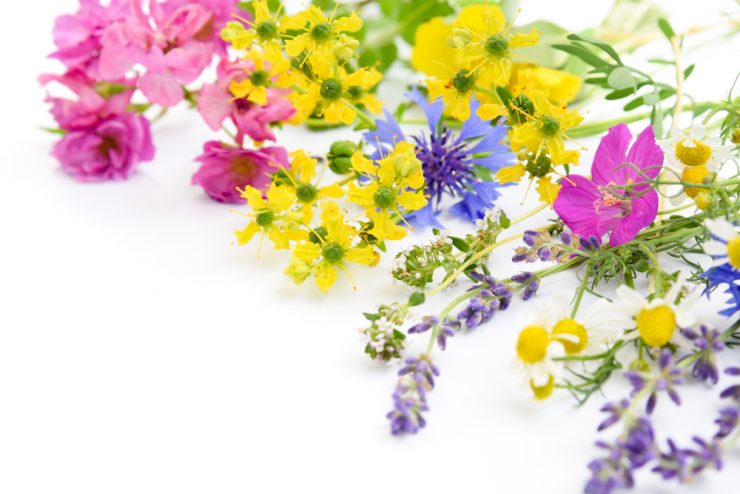Want to make summer salads more exciting and appealing? Try adding edible flowers. As well as providing plenty of colour, some have great health benefits too.
Medical herbalist Gabriella Clarke shares her top picks.
NASTURTIUMS
Colourful and peppery, nasturtiums are among the most popular edible flowers. They contain vitamin C and are a good source of carotenoids and flavonoids – both potent antioxidants. Nasturtiums also have strong antibacterial and antifungal properties and were traditionally used for respiratory and urinary tract infections.
ROSE PETALS
With a sweet floral taste, rose petals and rose water are popular ingredients in Middle Eastern and North African cuisine. Try adding them to a Moroccan couscous salad. Look out too for rose petal tea – it’s delicious and will help you to relax as well as lift your spirits.
LAVENDER FLOWERS
These make a lovely garnish for summer desserts and can also be added to bread, but remember less is more. Adding too much lavender to dishes adds a bitter flavour and they can end up tasting like perfume. Another lovely idea sure to impress and delight guests is to pop some lavender flowers into a glass of cool champagne. Lavender is traditionally used to promote relaxation and help combat insomnia.
MARIGOLDS
These gorgeous golden petals add a vibrant sunny hue to summer salads. They have a bitter, peppery, slightly spicy taste. With powerful antibacterial, antifungal, antiviral and anti-inflammatory properties, the marigold is known as one of the top healing herbs.
DANDELIONS
Not just for your pet rabbit, these golden blooms are also fit for human consumption. Despite their slightly bitter taste they are delicious. The plant and root are used widely in herbal medicine as digestive aids and liver cleansers.
BORAGE
These pretty blue star-shaped flowers are a good source of linolenic acid (found in the seeds) used to treat eczema, dermatitis and other skin disorders. Try freezing the flowers into ice cubes to add cooling fun and colour to summer drinks. The ancient saying ‘Borage for courage’ comes from a belief that Roman soldiers consumed it before going into battle.
FENNEL
All parts of the fennel plant are edible and the flowers make a great addition to fish salads. In herbal medicine fennel is used as a digestive aid and is often prescribed by herbalists to help beat the bloat.
CLOVER
Both the red and the white flowers make an attractive salad garnish. The red flowers can also be used to make wine.
WATCHPOINTS
- Only forage for flowers if you are certain you can identify them and you are sure that they are safe to eat.
- Never pick flowers growing close to roads. It’s better to grow your own – most seed packets will state whether they’re safe to eat.
- Don’t consume flowers bought from garden centres or florists. They may have been treated with pesticides and other chemicals.























